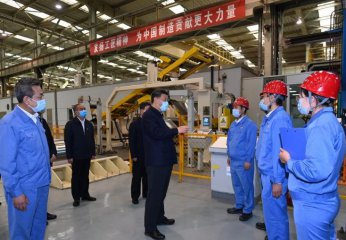BEIJING, May 27 (Xinhua) -- Amid the COVID-19 epidemic, China has been intensifying efforts to stabilize industrial and supply chains to help enterprises tide over the unprecedented challenges.
Despite the fast resumption of work and production in China, the shock of the pandemic has sent the world economy into severe recession, disrupted industrial and supply chains, and caused a contraction in international trade and investment.
While continuing to advance epidemic control, China has provided assistance to enterprises, reducing taxes and fees, exempting tolls on highways, reducing the costs of energy use and granting subsidized loans.
Listed among the six areas in which security must be maintained, the stability of industrial and supply chains was reiterated in the government work report delivered by Premier Li Keqiang last week at the annual session of the National People's Congress (NPC).
The country has vowed to make all-out efforts to keep the industrial chain stable and smooth with earnest policy implementation.
Signs of recovery are shown in the latest figures. Profit decline of China's major industrial firms in April narrowed 30.6 percentage points from March, and 33 of all 41 industrial sectors surveyed saw better profitability last month.
In the next six months, the country will pick up its pace in restoring production and supply thanks to effective COVID-19 response, said national political advisor Ning Gaoning, also chairman of chemical firm Sinochem Group.
Among the enterprises that have found their way out is Liaoning Oxiranchem, Inc., a chemical producer in northeast China.
"The past few months of epidemic control and economic reopening made us understand more clearly the importance of unclogging and stabilizing industrial and supply chains," said company chairman Zhu Jianmin, also a political advisor.
COVID-19 hit the firm hard. In the first quarter, Oxiranchem, which had witnessed fast growth for 28 years, saw its output plummet 26 percent year on year with an 80-percent profit plunge.
However, the firm came back into gear in April through coordination with its upstream suppliers, support for downstream enterprises and advancement in technological innovation, Zhu said, expecting year-on-year growth in output, sales and profit this month.
The country will step up efforts to help businesses, especially small ones, to tide over the difficulties, said Ning Jizhe, deputy head of the National Development and Reform Commission, stressing the optimization of domestic and global logistics resources.
"Solid implementation of such government policies will surely help more private businesses," Zhu said.
NPC deputy Dong Mingzhu, chairwoman of home appliance giant Gree Electric Appliances, echoed Zhu's views.
"Stabilizing the industrial chain is of vital importance, and large companies should take the lead in coordinating efforts of upstream and downstream firms," said Dong.
Despite weak Q1 sales, Gree will continue to strengthen innovation and technological R&D amid steps toward high-end intelligent manufacturing, she said.
"Besides the government's policy support, enterprises also need to be more self-reliant to become more competitive," Dong said.



















Latest comments